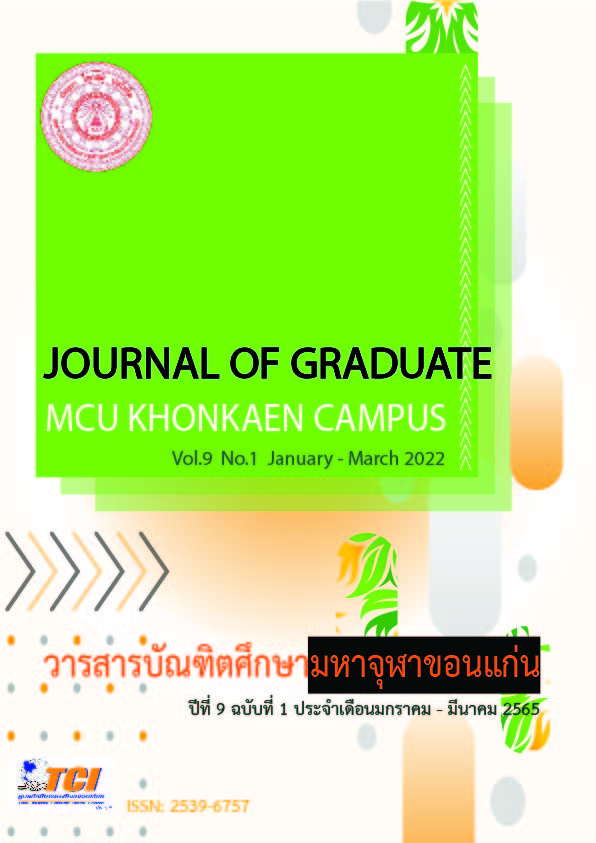การบริหารงานของภาวะผู้นำตามหลักสุจริตธรรม
Main Article Content
บทคัดย่อ
การบริหาร เป็นภาระหน้าที่ของผู้นำที่เป็นทั้งศาสตร์และศิลป์ในการทำงานให้บรรลุเป้าหมาย
ร่วมกับคนอื่นโดยดำเนินการให้บรรลุวัตถุประสงค์ ภาวะผู้นำ เป็นภาวะที่ก่อให้เกิดศรัทธาเป็นที่ยอมรับ และที่นำพาให้คนอื่นเคลื่อนไหวหรือกระทำการในทิศทางที่ผู้นำกำหนดเป้าหมายไว้ ภาวะผู้นำต้องมีสติปัญญา ความดีงาม ความรู้ความสามารถที่ชักนำให้คนทั้งหลาย มาประสานกันและพากันไปสู่จุดหมายที่ดีงาม ลักษณะและคุณสมบัติของภาวะผู้นำนั้น ต้องมีปัญญามองการณ์ไกล มีความเชี่ยวชาญเฉพาะด้าน เป็นที่พึ่งพาอาศัยคนอื่นได้ มีการศึกษาดี เฉลียวฉลาด เชื่อมั่นในตนเอง มีหลักสุจริตธรรม ที่สามารถควบคุมความประพฤติที่ชอบตามคลองธรรม ตั้งใจดี ซื่อตรง มีความสุจริตทางกายการทำสิ่งที่ดีงาม ช่วยเหลือเกื้อกูล สงเคราะห์ประโยชน์แก่ประชาชน ไม่เอารัดเอาเปรียบผู้อื่น สุจริตทางวาจา ด้วยพูดสิ่งที่ดีงาม กล่าวแต่คำสัตย์ พูดแต่คำที่เหมาะสมส่งเสริมสามัคคีมีเหตุผล และสุจริตทางใจ ด้วยคิดสิ่งที่ดีงาม ไม่เพ่งเล็งคิดหาทางเอาแต่จะได้ คิดเสียสละ เป็นหลักพุทธธรรมที่ทำให้ผู้นำมีภาวะความเป็นผู้นำที่ประกอบด้วยธรรมเป็นแบบอย่างที่ดีให้กับองค์กรในสังคมนั้น ๆ ต่อไป
Article Details

อนุญาตภายใต้เงื่อนไข Creative Commons Attribution-NonCommercial-NoDerivatives 4.0 International License.
เอกสารอ้างอิง
กวี วงศ์พุฒ. (2539). ภาวะผู้นำ. (พิมพ์ครั้งที่ 4). กรุงเทพฯ: ศูนย์ส่งเสริมวิชาชีพบัญชี.
เติมศักดิ์ ทองอินทร์. (2547). ความรู้เบื้องต้นทางการบริหารรัฐกิจ. กรุงเทพฯ: โรงพิมพ์มหาจุฬาลงกรณราชวิทยาลัย.
ธงชัย สันติวงษ์. (2537). องค์การและการบริหาร. (พิมพ์ครั้งที่ 9). กรุงเทพฯ: ไทยวัฒนาพานิช.
ธรรมศึกษาออนไลน์. หลักสุจริต 3. สืบค้นเมื่อ 1 ตุลาคม 2564, จาก http://www.xn--12c9b1aha5ai6e7a.com/2013/05/sucrit-3.html
เนตร์ พัณณายาวิราช. (2546). การจัดการสมัยใหม่. กรุงเทพฯ: เซ็นทรัลเอ็กซ์เพรส.
ประเวศ วะสี. (2542). ภาวะผู้นำ สภาพในสังคมไทยและวิธีแก้ไข ในภาวะผู้นำความสำคัญต่ออนาคตไทย. กรุงเทพฯ: มติชน.
พระเทพเวที (ประยุทธ์ ปยุตฺโต). (2534). พุทธศาสนาในฐานะเป็นรากฐานของวิทยาศาสตร์. กรุงเทพฯ: พิมพ์อําไพ.
พระพรหมคุณาภรณ์ (ป.อ.ปยุตฺโต). (2546). ภาวะผู้นำ: ความสำคัญต่อการพัฒนาคน พัฒนาประเทศ. กรุงเทพฯ: ธรรมสภา.
มหาจุฬาลงกรณราชวิทยาลัย. (2539). พระไตรปิฎกภาษาไทย ฉบับมหาจุฬาลงกรณราชวิทยาลัย. กรุงเทพฯ: โรงพิมพ์มหาจุฬาลงกรณราชวิทยาลัย,
รังสรรค์ ประเสริฐศรี. (2544). ภาวะผู้นำ. กรุงเทพฯ: ธนธัชการพิมพ์.
ราชบัณฑิตยสภา. (2540). พจนานุกรมฉบับบัณฑิตราชสถาน. กรุงเทพฯ: สำนักพิมพ์ราชบัณฑิต.
สมยศ เชื้อไทย. (2551). ความรู้กฎหมายทั่วไป: คำอธิบายวิชากฎหมายแพ่ง: หลักทั่วไป. (พิมพ์ครั้งที่ 15). กรุงเทพฯ: สำนักพิมพ์วิญญูชน.
สุรศักดิ์ ม่วงทอง. (2543). พุทธธรรมกับภาวะผู้นำที่พึงประสงค์ : ศึกษาเฉพาะกำนันผู้ใหญ่บ้านจังหวัดนครศรีธรรมราช. วิทยานิพนธ์ปริญญาอักษรศาสตรมหาบัณฑิต. คณะสังคมศาสตร์และมนุษยศาสตร์, บัณฑิตวิทยาลัย: มหาวิทยาลัยมหิดล.
Mitchell, T. R., & Larson, J. R. (1987). People in Organizations : An Introduction to Organization Behavior (3rd ed.). New York: McGraw-Hill.

